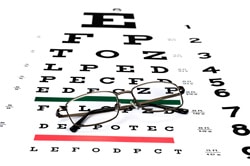Routine Eye Exams Only Check for Visual Acuity.
The school eye exam has become a staple in the opening school activities each year when our children return for the new school year. Unfortunately, too many parents think this annual exam is sufficient to catch any problems with their child’s vision.
Routine eye exams at school only check for visual acuity. If the exam is done by the school nurse, which is not always the case, your child may get a cursory exam of the eye itself to check eye health. This is usually not enough.
Visual Skills
Would you be surprised to learn there are 17 visual skills that we all need in order to be successful in reading, learning, in sports and in life? Seeing ‘20/20’ is just one these important skills. Here’s the full list:
1. Controlling eye movements
2. Simultaneously focusing at a far distance
3. Sustaining focus at a far distance
4. Simultaneously focusing at a near distance
5. Sustaining focus at a near distance
6. Simultaneous alignment at a far distance
7. Sustaining alignment at a far distance
8. Simultaneous alignment at a near distance
9. Sustaining alignment at a near distance
10. Visual acuity or central vision
11. Peripheral vision
12. Depth Awareness
13. Color perception
14. Gross visual-motor coordination
15. Fine visual-motor coordination
16. Visual perception
17. Visual integration
Developmental Eye Exams
A developmental eye exam will test your child for visual acuity, eye health, and the seventeen necessary visual skills that make up a fully functioning visual system.
Our vision is developed from infancy. When we’re born, our eyes can see only dark shadows. Just like we learn to walk over time, so our vision develops over time as our visual skills are used on a daily basis. Over time, we learn to master the visual skills we need.
Developmental eye exams are designed to identify problems with the acquisition of these visual skills. They are non-invasive exams and are performed by trained developmental optometrists. If there is an accompanying medical complaint, such as a headache or eyestrain, most insurance will cover a developmental eye exam.

The Facts as We Know Them
A developmental eye exam will test your child for visual acuity, eye health, and the seventeen necessary visual skills that make up a fully functioning visual system.
1
Your child’s school may tell you that your child took a Snellen chart vision screening test and passed with flying colors. This test only checks for visual acuity, and only at a distance. This “your child passed” report can give parents a sense of security but it is, in essence, a false sense of security.
2
Schools spend a lot of money and resources treating reading and learning problems. These problems may originate from symptoms, however, not the cause. The schools are not usually equipped to identify or treat developmental vision disorders.
3
Mandatory eye exams before entering school are currently required in only the following states: Kentucky, Illinois and Missouri.
4
The only states where eye exams are mandatory when entering a special education program are Massachusetts and Ohio. These exams are required within the first three months of the child’s entrance into special education.
5
According to the National PTA (1999), as many as 25 percent of all students have some type of problem processing visual information.
6
The National Center of Adult Literacy estimates that 66 percent of illiterate adults have one or more visual processing problems.
7
A study done at Folsom Prison estimates that 70 percent of juveniles who encounter trouble with the law have a visual processing problem.
8
The National Institute for Literacy estimates that poor basic skills cost businesses approximately $60 billion a year.
Is 20/20 Enough?
We tend to get hung up on numbers in today’s society. When it comes to our vision, we’ve been conditioned to think that 20/20 vision means we’re good enough. A person have 20/20 eyesight but still have a visual problem that interferes with his or her ability to interpret meaning and gain understanding from what he or she is actually seeing.
School eye exams are fine for what they do. But they are not enough and should not be considered the definitive authority on your child’s vision. Add a developmental eye exam to your child’s yearly routine to make certain he or she is seeing all there is to see in the world they’re learning to explore.
CONTACT US
Vision Care & Therapy Center

Dr. Janna Iyer, FCOVD
Dr. Alayna Larsen
11735 Pointe Place
Roswell, Ga 30076
678-256-3990
Office Hours
Mon-Thu 9:00am-6:00pm
Fri 9:00am-1:00pm
Appointments
678-256-3990
Patient Infomation


